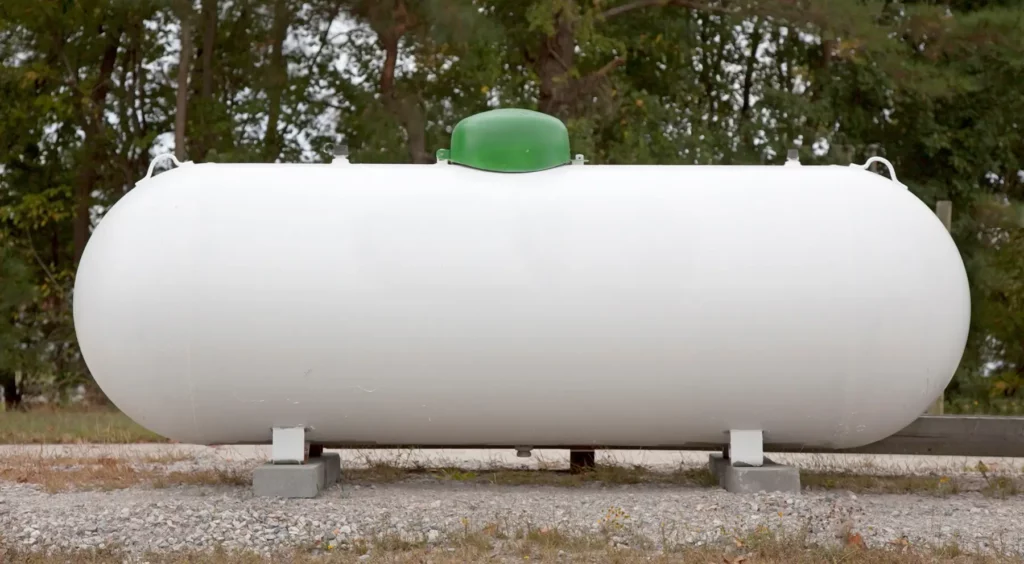Propane is a versatile fuel source for heating, cooking, and more in many households and industries. However, one common issue that propane users face, especially during cold weather, is the freezing of their propane tanks. This article will explore the reasons behind propane tank freezing, the potential dangers, and, most importantly, how to prevent it. We will also discuss whether propane gas can freeze and how cold weather affects propane tanks.
Table of Contents
Why Is My Propane Tank Freezing?
Propane tanks freeze primarily due to the rapid vaporization of propane within the tank. When propane is released from the tank to fuel your appliances, it undergoes a phase change from liquid to gas, a process that requires heat energy. As propane vaporizes, it absorbs heat from the surrounding environment, causing the tank’s temperature to drop. In frigid weather, this can lead to the tank freezing.
Can Propane Lines Freeze?
Yes, propane lines can freeze. Like the propane tank, propane lines can experience freezing in cold temperatures. When the gas inside the lines expands, it absorbs heat, leading to the formation of ice. Frozen propane lines can impede gas flow to your appliances, causing heating or cooking issues.
Is It Dangerous When a Propane Tank Freezes?
Freezing propane tanks can pose certain dangers. While the propane itself does not freeze, the drop in tank temperature can affect pressure levels, potentially causing regulator malfunctions. These malfunctions can lead to an irregular propane supply to your appliances, which can be inconvenient and potentially dangerous in cold conditions. Additionally, in extreme cases, frozen tanks can develop stress fractures or damage, leading to gas leaks.
How to Keep a Propane Tank From Freezing While Running
Preventing propane tank freezing while in use is essential for maintaining a steady fuel supply. Here are some tips to ensure your tank remains operational in cold weather:
Use an Insulating Blanket
Wrapping your propane tank with an insulating blanket can help retain heat and prevent freezing. These blankets are available at most hardware stores and are easy to install.
Maintain Adequate Gas Levels
Keep your propane tank at least 20% full to reduce the vaporization rate and, consequently, the risk of freezing.
Regulator Placement
Position the propane regulator above the tank so that any condensed water drains away, reducing the likelihood of freezing.
Install a Windbreak
Shield your propane tank from the cold winds by using a windbreak or constructing a simple barrier around it.
Monitor the Tank
Regularly check your tank’s pressure gauge to ensure it remains within the recommended range.
Does Cold Weather Affect Propane Tanks?
Cold weather indeed affects propane tanks. As the temperature drops, the tank’s exterior becomes colder, leading to the risk of freezing, as discussed earlier. However, cold weather also reduces the vaporization rate of propane, potentially affecting the efficiency of your appliances. In extremely cold conditions, the pressure inside the tank can drop, affecting the gas supply.
Does Propane Gas Freeze?
Propane gas itself does not freeze. It remains gaseous at temperatures well below freezing, making it a reliable energy source even in the coldest climates. The freezing point of propane is approximately -44°F (-42°C). This means propane gas remains in a gaseous state at temperatures above -44°F and only becomes a liquid when cooled below this threshold. As a result, the gas itself will not freeze inside the tank.
Why Do Propane Tanks Get Cold?
Propane tanks get cold due to the thermodynamics of the propane phase change. When propane is released from the tank to power appliances, it absorbs heat from the tank and its surroundings. This process, called vaporization, is necessary for propane to be used as fuel. As a result, the tank temperature decreases rapidly, and in frigid conditions, it can lead to the tank’s surface freezing.
Summary
Preventing propane tank freezing is crucial to maintain a continuous fuel supply and avoid potential hazards. By using insulation, maintaining adequate gas levels, regulating the positioning of equipment, and monitoring the tank’s pressure, you can ensure a reliable propane source even in cold weather. Understanding the science behind freezing propane and taking appropriate measures will help you safely and efficiently use this versatile energy source throughout the year.




